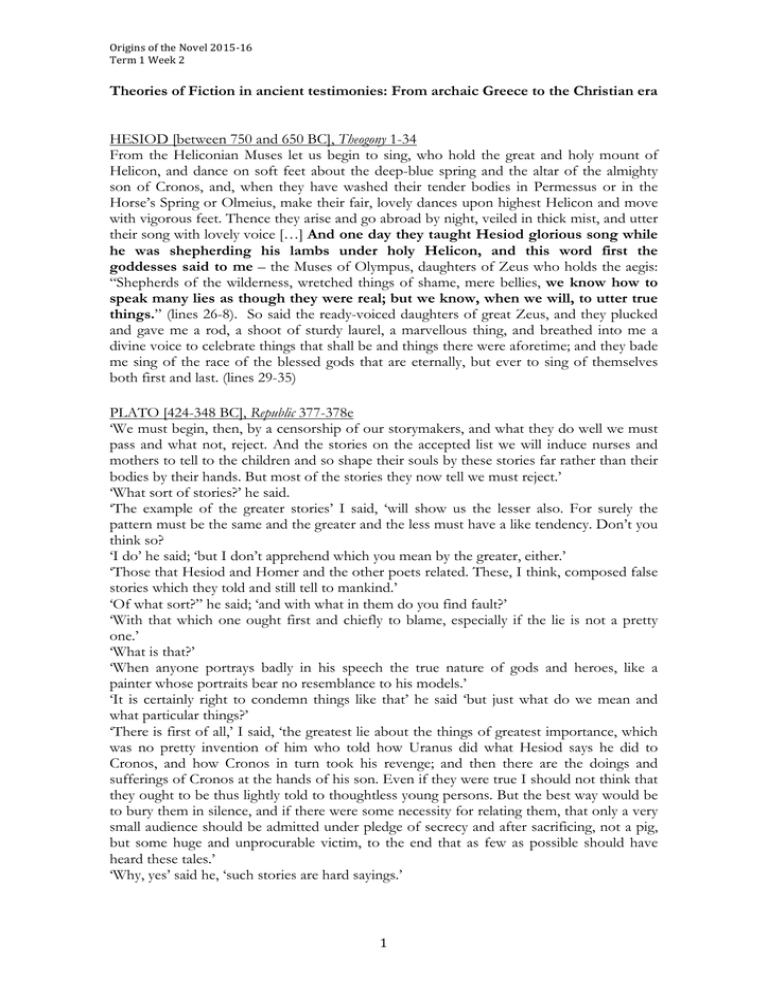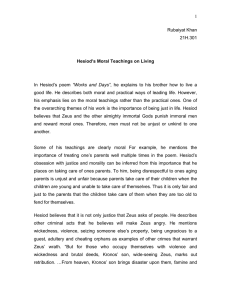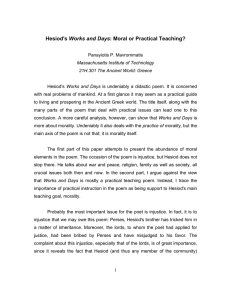Document 12946394
advertisement

Origins of the Novel 2015-­‐‑16 Term 1 Week 2 Theories of Fiction in ancient testimonies: From archaic Greece to the Christian era HESIOD [between 750 and 650 BC], Theogony 1-34 From the Heliconian Muses let us begin to sing, who hold the great and holy mount of Helicon, and dance on soft feet about the deep-blue spring and the altar of the almighty son of Cronos, and, when they have washed their tender bodies in Permessus or in the Horse’s Spring or Olmeius, make their fair, lovely dances upon highest Helicon and move with vigorous feet. Thence they arise and go abroad by night, veiled in thick mist, and utter their song with lovely voice […] And one day they taught Hesiod glorious song while he was shepherding his lambs under holy Helicon, and this word first the goddesses said to me – the Muses of Olympus, daughters of Zeus who holds the aegis: “Shepherds of the wilderness, wretched things of shame, mere bellies, we know how to speak many lies as though they were real; but we know, when we will, to utter true things.” (lines 26-8). So said the ready-voiced daughters of great Zeus, and they plucked and gave me a rod, a shoot of sturdy laurel, a marvellous thing, and breathed into me a divine voice to celebrate things that shall be and things there were aforetime; and they bade me sing of the race of the blessed gods that are eternally, but ever to sing of themselves both first and last. (lines 29-35) PLATO [424-348 BC], Republic 377-378e ‘We must begin, then, by a censorship of our storymakers, and what they do well we must pass and what not, reject. And the stories on the accepted list we will induce nurses and mothers to tell to the children and so shape their souls by these stories far rather than their bodies by their hands. But most of the stories they now tell we must reject.’ ‘What sort of stories?’ he said. ‘The example of the greater stories’ I said, ‘will show us the lesser also. For surely the pattern must be the same and the greater and the less must have a like tendency. Don’t you think so? ‘I do’ he said; ‘but I don’t apprehend which you mean by the greater, either.’ ‘Those that Hesiod and Homer and the other poets related. These, I think, composed false stories which they told and still tell to mankind.’ ‘Of what sort?” he said; ‘and with what in them do you find fault?’ ‘With that which one ought first and chiefly to blame, especially if the lie is not a pretty one.’ ‘What is that?’ ‘When anyone portrays badly in his speech the true nature of gods and heroes, like a painter whose portraits bear no resemblance to his models.’ ‘It is certainly right to condemn things like that’ he said ‘but just what do we mean and what particular things?’ ‘There is first of all,’ I said, ‘the greatest lie about the things of greatest importance, which was no pretty invention of him who told how Uranus did what Hesiod says he did to Cronos, and how Cronos in turn took his revenge; and then there are the doings and sufferings of Cronos at the hands of his son. Even if they were true I should not think that they ought to be thus lightly told to thoughtless young persons. But the best way would be to bury them in silence, and if there were some necessity for relating them, that only a very small audience should be admitted under pledge of secrecy and after sacrificing, not a pig, but some huge and unprocurable victim, to the end that as few as possible should have heard these tales.’ ‘Why, yes’ said he, ‘such stories are hard sayings.’ 1 Origins of the Novel 2015-­‐‑16 Term 1 Week 2 ‘Yes, they are not to be told, Adeimantus, in our city, nor is it to be said in the hearing of a young man, that in doing the utmost wrong, he would do nothing to surprise anybody, and that even if he chastises his father to the limit when he does wrong, he will only be following the example of the first and greatest among the gods’ ‘No, by heaven, I do not myself think that they are fit to be told.’ ‘Neither must we admit at all’ said I, ‘that gods war with gods and plot against one another and contend—for it is not true either—if we wish our future guardians to deem nothing more shameful than lightly to fall out with one another; still less must we make battles of gods and giants the subject for them of stories and embroideries, and other enmities many and manifold of gods and heroes toward their kith and kin. But if there is any likelihood of our persuading them that no citizen ever quarrelled with his fellow-citizen and that the very idea of it is an impiety, that is the sort of thing that ought rather to be said by their elders, men and women, to children from the beginning and as they grow older, and we must compel the poets to keep close to this in their compositions. But Hera’s fetterings by her son and the hurling out of heaven of Hephaestus by his father when he was trying to save his mother from a beating, and the battles of the gods in Homer’s verse are things that we must not admit into our city either wrought in allegory or without allegory. For the young are not able to distinguish what is and what is not allegory, but whatever opinions are taken into the mind at that age are likely to prove indelible and unalterable.’ ARISTOTLE [384-222 BC], Poetics 1451a-b What we have said already makes it further clear that a poet’s object is not to tell what actually happened but what could and would happen either probably or inevitably. The difference between a historian and a poet is not that one writes in prose and the other in verse—indeed the writings of Herodotus could be put into verse and yet would still be a kind of history, whether written in metre or not. The real difference is this, that one tells what happened and the other what might happen. For this reason poetry is something more scientific and serious than history, because poetry tends to give general truths while history gives particular facts. By a general truth; I mean the sort of thing that a certain type of man will do or say either probably or necessarily. That is what poetry aims at in giving names to the characters. A particular fact is what Alcibiades did or what was done to him. In the case of comedy this has now become obvious, for comedians construct their plots out of probable incidents and then put in any names that occur to them. They do not, like the iambic satirists, write about individuals. In tragedy, on the other hand, they keep to real names. The reason is that what is possible carries conviction. If a thing has not happened, we do not yet believe in its possibility, but what has happened is obviously possible. PLUTARCH [46-120 AD], Moralia 15c-d For the element of deception [in poetry] does not gain hold on utterly witless and foolish persons. This is the ground of answer of Simonides [556-468 BC] to the man who said to him, ‘Why are the Thessalians the only people whom you do not deceive?’ His answer was, ‘Oh they are too ignorant to be deceived by me; and Gorgias [485-380BC] called tragedy a deception wherein he who deceives is more honest than he who does not deceive, and he who is deceived is wiser than he who is not deceived. • Compare: PLUTARCH Moralia 348c: Tragedy did flourish and was famous: a wonderful experience for the eyes and ears of that generation. It lent to myth and emotion a deceit wherein, as Gorgias says, the deceiver is more just than the non-deceiver and the deceived is wiser than the undeceived. The deceiver is more just because he has fulfilled his promise; the deceived is wiser because it takes a measure of sensibility to be accessible to the pleasures of literature. 2 Origins of the Novel 2015-­‐‑16 Term 1 Week 2 STRABO [64BC-24AD], Geography 1.2.9 Homer was wont to add a mythical element to actual occurrences, thus giving flavour and adornment to his style; but he has the same end in view as the historian or person who narrates facts. So for instance he took the Trojan War, an historical fact, and decked it out with his myths and he did the same in the case of the wanderings of Odysseus; but to hang an empty story of marvels on something wholly untrue is not Homer’s way of doing things. For it occurs to us at once, doubtless, that a man will lie more plausibly if he will mix in some actual truth. CICERO [106-43 BC], De legibus (On Laws) 1.1 Atticus: People are curious about the truth or falsehood of many things in the Marius, and since you are dealing with recent events and a man from Arpinum, they expect the truth from you. Marcus[Tullius Cicero]: I certainly don’t want to be considered a liar, but those people, Titus [Pomponius Atticus], behave ignorantly in such circumstances, in looking for the truth of a witness when examining a poet. No doubt these same people believe that Numa talked with Egeria, and that the priest’s cap was placed on Tarquinius’ head by the eagle. Quintus [Tullius Cicero]: I gather, brother, that you think there are different rules to be observed in a poem from those that apply to history? Marcus: In the one case, Quintus, everything aims at truth; in the other, much aims at pleasure, although there are countless fables both in Herodotus the father of history and in Theopompus. HORACE [65BC - 8BC], Ars poetica (Art of Poetry) 150-2 …and in such a manner [the poet] forms his fictions, so intermingles the false with the true, that the middle is not inconsistent with the beginning, nor the end with the middle. SENECA THE YOUNGER [4-65AD], Apocolocyntosis (The Pumpkinfication of Claudius), 1 I wish to place on record the proceedings in heaven on the third day before the Ides of October, of the new year which begins this auspicious age. It shall be done without malice or favour. This is the truth. Ask, if you like, how I know it? To begin with, I am not bound to please you with my answer: who is going to make me? I know I have been free to do as I like since the day when he died who had made the proverb true: one must be born either a Pharaoh or a fool. If I choose to answer, I will say whatever trips off my tongue. Who has ever made the historian produce witness to swear for him? But if an authority must be produced, ask of the man who saw Drusilla translated to heaven: the same man will declare he saw Claudius on the road, limping in the same direction. LUCIAN [125-180AD], True Stories 1.1-2 They will find it enticing not only for the novelty of its subject, for the humour of its plan and because I tell all kinds of lies in a plausible and specious way, but also because everything in my story is a more or less comical parody of one or another of the poets, historians and philosophers of old, who have written much that smacks of miracles and fables. I would cite them by name, were it not that you yourself will recognise them from your reading. One of them is Ctesias, son of Ctesiochus, of Cnidos, who wrote a great deal about India and its characteristics that he had never seen himself nor heard from anyone else with a reputation for truthfulness. Iambulus also wrote much that was strange about the countries in the great sea: he made up a falsehood that is patent to everybody, but wrote a story that is not uninteresting for all that. Many others, with the same intent, have written about imaginary travels and journeys of theirs, telling of huge beasts, cruel men and 3 Origins of the Novel 2015-­‐‑16 Term 1 Week 2 strange ways of living. Their guide and instructor in this sort of charlatanry is Homer’s Odysseus, who tells Alcinous and his court about winds in bondage, one-eyed men, cannibals and savages; also about animals with many heads, and transformations of his comrades wrought with drugs. This stuff, and much more like it, is what our friend humbugged the illiterate Phaeacians with! Well, on reading all these authors, I did not find much fault with them for their lying, as I saw that this was already a common practice even among men who profess philosophy. I did wonder, though, that they thought that they could write untruths and not get caught at it. Therefore, as I myself, thanks to my vanity, was eager to hand something down to posterity, that I might not be the only one excluded from the privileges of poetic licence, and as I had nothing true to tell, not having had any adventures of significance, I took to lying. But my lying is far more honest than theirs, for though I tell the truth in nothing else, I shall at least be truthful in saying that I am a liar. I think I can escape the censure of the world by my own admission that I am not telling a word of truth. Be it understood, then, that I am writing about things which I have neither seen nor had to do with nor learned from others – which, in fact, do not exist at all and, in the nature of things, cannot exist. Therefore my readers should on no account believe in them. Once upon a time, setting out from the Pillars of Hercules and heading for the western ocean with a fair wind, I went a-voyaging… MACROBIUS [flor. 395-425 AD], In Somnium Scipionis (On the Dream of Scipio) 1.2.3-8 Colotes says that a story should not be made up by a philosopher because no kind of fictional invention is suitable for those who profess truth… [On Plato’s Myth of Er] Colotes said: If you wished to impart to us a conception of the heavenly realms and reveal the condition of souls, why did you not do so in a simple and straightforward way? But instead you sought a character, worked out a new plot, and invented a scenario which all defiled with mendacity the very portals of truth we are now seeking… Comedies such as Menander or his imitators have written please our sense of hearing, or stories filled with fictional adventures of lovers, with which [Petronius] Arbiter occupied himself and in which, remarkably, Apuleius sometimes indulged. This whole class of stories, which engages in producing only pleasure for the ears, a philosophical treatise expels from its sacred shrine into nursemaids’ cradles. LACTANTIUS [c.250-c.325 AD], Institutiones divinae (Divine Institutes) 1.11 The poet’s function consists in this, that those things which were actually done he may transfer with graceful converse into other appearances by means of figurative language. But to feign the whole account which you relate – that is to be a fool and liar instead of a poet. Questions to consider/present: 1. What does Hesiod suggest with the opening to his Theogony? 2. Why is the Hesiod passage significant for our understanding of fiction in ancient literature? 3. Why does Plato take issue with the poetry of Homer and Hesiod? 4. Do you agree with Aristotle’s differentiation between history and poetry? If so, why? If not, why not? 5. How does Aristotle’s view on poetry compare with that of Plato? 4 Origins of the Novel 2015-­‐‑16 Term 1 Week 2 6. Can we extract a theory of fiction from Aristotle? If so, what is it? 7. What does the Plutarch passage tell us about the relationship between writer and reader of fiction? 8. What is the relationship between epic and fiction according to Strabo? 9. Is there anything in what Cicero says about the difference between history and poetry that is not found in Aristotle? 10. What does Horace stress in his discussion of the formation of fiction? How different is his view compared with that of Aristotle and Strabo? 11. Seneca’s Apocolocyntosis is a Roman satire about the deification of the emperor Claudius. In Seneca’s view, is there any difference in terms of truth-value between historiography and satire? 12. What does the Seneca passage tell us about the relationship between truth, fiction, and satire? 13. How does Lucian characterise his work, the True Histories? 14. Why does Lucian pick on philosophy? 15. Do we come closer to a definition of ‘fiction’ in antiquity with this passage of Lucian? 16. Reading between the lines of the Macrobius passage, what do you think are the key elements that turn a fictional narrative into a novel? 17. The Lactantius passage is some 1000 years after the Hesiod passage. Have ancient theories on fiction changed during that time? 5





